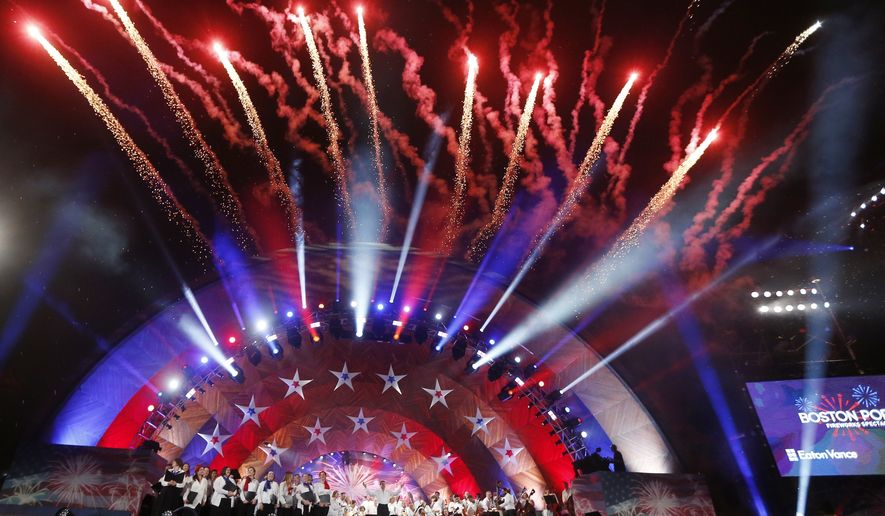Recent surveys have exposed a rift on patriotic attitudes that academics say could lead to Independence Day becoming a holiday embraced mostly by conservatives.
• A Gallup poll reported Thursday that 58% of Republicans, 34% of independents and 26% of Democrats said they are “extremely proud” to be American. That is down from 87% of Republicans, 65% of independents and 62% of Democrats in the same poll last summer.
• A nationwide survey of 2,000 college students reported Tuesday that 76% of self-identified conservative undergraduates feel “proud to be an American,” while 40% of liberals feel likewise.
• A December 2020 study from the nonpartisan More in Common US found that 34% of self-identified “progressive activists” and 51% of Generation Z were proud to be Americans.
These pandemic-era surveys follow a July 2018 Gallup poll finding that just 23% of liberals were “extremely proud” to be Americans, compared with 65% of conservatives.
“As a card-carrying liberal, I am both saddened and appalled by the way the left has ceded patriotism to the right,” said Jonathan Zimmerman, a professor in the history of education at the University of Pennsylvania.
Mr. Zimmerman noted that abolitionist Frederick Douglass, suffragist Susan B. Anthony and civil rights leader Martin Luther King Jr. were “ardent patriots” who understood that they needed to love the nation’s “ideals of liberty and equality.”
“My fellow liberals need to reclaim this mantle of critical patriotism. Let’s teach our young people to love the idea of America so they will be inspired to make it a reality,” he said.
Robert Gmeiner, an assistant professor of economics at Methodist University in North Carolina, said a negative view of America’s “founding ideals of freedom and its history of emancipation” is turning more students away from patriotic displays such as flags and fireworks.
“I believe that Independence Day is indeed becoming a conservative holiday, but this is a result of a misguided view that America was not founded on freedom,” Mr. Gmeiner said.
“Even conservative students tend to be cynical about America and its future. Everything is funny, everything is ironic, everything is subjected to immediate parody,” said Richard Gamble, a professor of history at Hillsdale College. “Displays of patriotism are also seen, I suspect, as [baby] boomer.”
Tuesday’s college survey was conducted by North Dakota State University among 2,000 students in all 50 states. Clay Routledge, the study’s co-author, said liberal students were more likely than conservatives to report that “their college experience has given them a more negative view of the United States” because of the influence of “left-leaning professors.”
“So, one possibility is that left-leaning students are having their views reinforced in college, which could be leading to more negative attitudes about their national identity,” Mr. Routledge, a North Dakota State social psychologist, said in an email.
That suggests that Independence Day could be embraced mostly by conservatives in the future, said academics on both sides of the ideological fence.
Peter Wood, president of the conservative National Association of Scholars, said efforts by liberals to replace 1776 with 1619 as the real founding date of the nation have turned many students away from celebrating the Fourth of July.
July Fourth marks the date of the signing of the Declaration of Independence in 1776, and 1619 marks the arrival of the first enslaved Africans in colonial Virginia.
“Those who seek to honor the holiday as a recognition of the Declaration of Independence are now generally conservatives,” said Mr. Wood, a former associate provost at Boston University. “Young people are especially prone to this debunking of 1776 because it has been mainstreamed into their schools.”
Sara Clarke Kaplan, executive director of the Antiracist Research and Policy Center at American University, said liberals have good reason to reject “unquestioning acceptance of, or pride in, everything the U.S. has done as a nation.”
“From Frederick Douglass’s ‘What, to the Slave, is the Fourth of July,’ to Martin Luther King Jr.’s ‘Letter From Birmingham Jail,’ we have seen that it is not blind acceptance and unthinking patriotism that moves the dial on social justice, but informed and principled challenges to the status quo,” Ms. Kaplan said in an email.
As fewer K-12 schools teach the meaning of the Fourth of July, young people are forming their attitudes about the country from other sources, some researchers say.
“Those who are more disenchanted with the United States, especially among younger people, tend to gravitate toward news outlets and social media that are critical of U.S. flaws and history,” said Ray Guarendi, an Ohio-based clinical psychologist who counsels parents and families.
In a June 24 survey of 1,024 middle school and high school students, conducted digitally by the homework learning platform Brainly for The Washington Times, 53.9% of students said they had learned about the Fourth of July in school and 33.1% said they hadn’t. The remainder skipped the question.
Judson C. Edwards, dean of the business college at Troy University in Alabama, said a growing focus in education on the nation’s injustices rather than its independence is making young people less eager to celebrate July Fourth.
“Unfortunately, looking at this nationally, I think Independence Day has gradually become less of a unifying celebration, but rather a day to showcase our differences,” Mr. Edwards said. “Celebrating our freedom while demonizing the Founding Fathers. Celebrating our good economic fortune while reminding us of the injustices of income inequality and what free enterprise does to oppress the world.”
• Sean Salai can be reached at ssalai@washingtontimes.com.




Please read our comment policy before commenting.